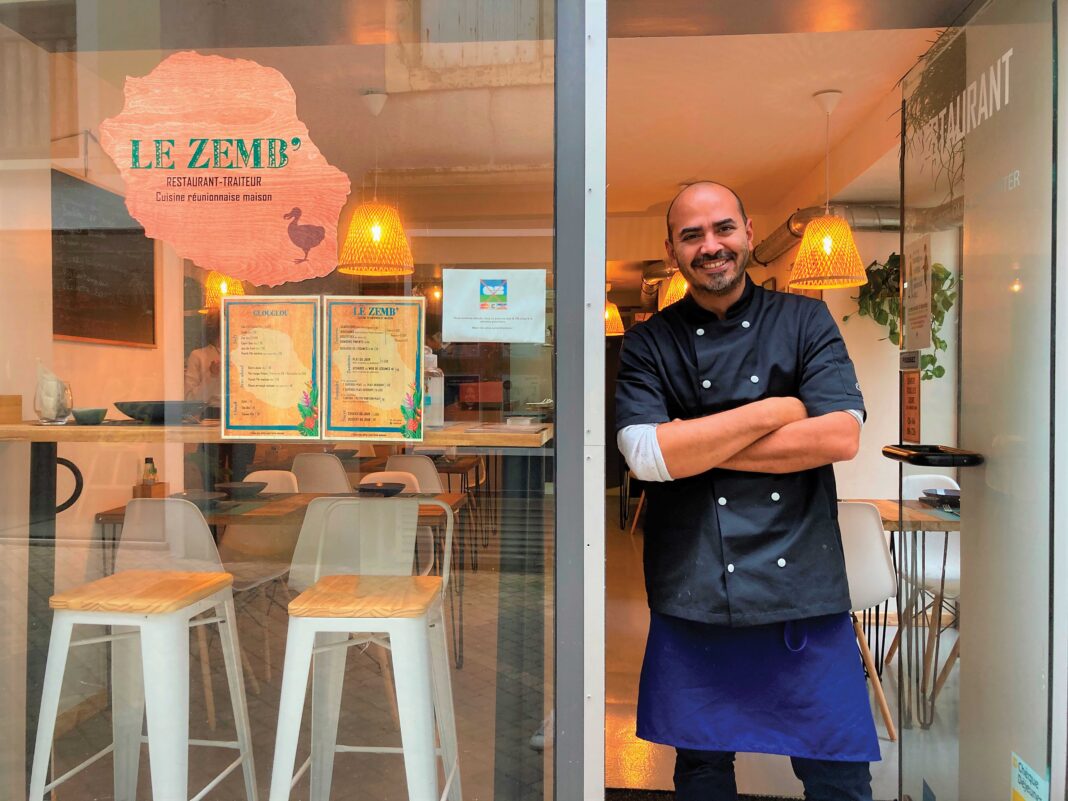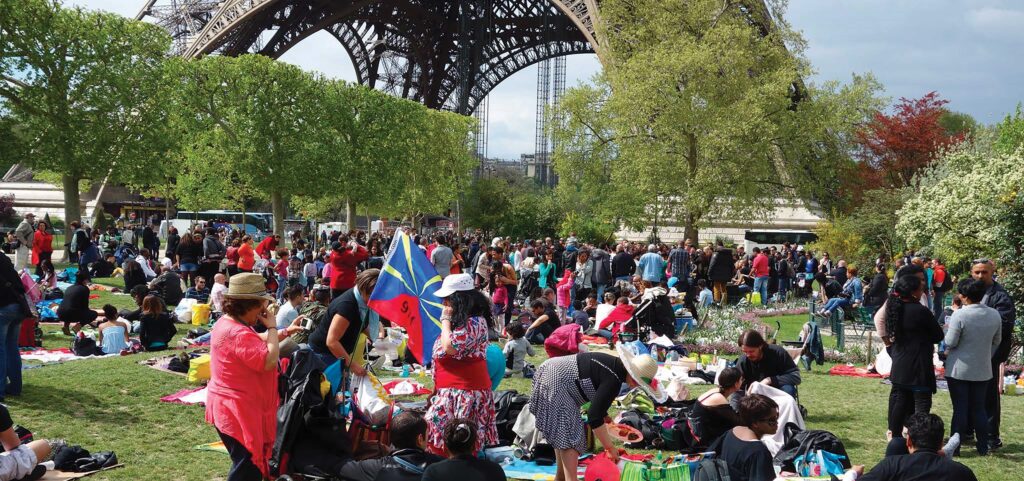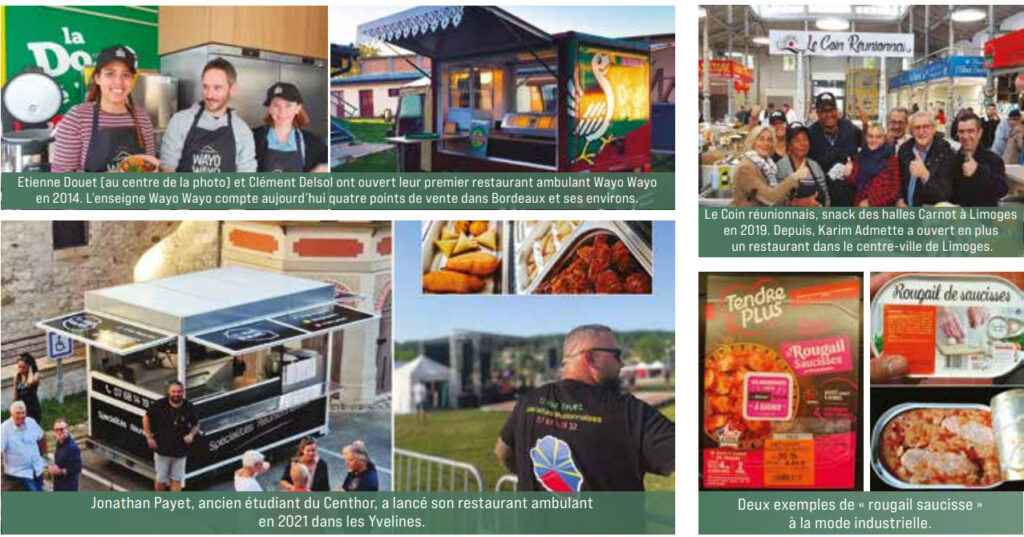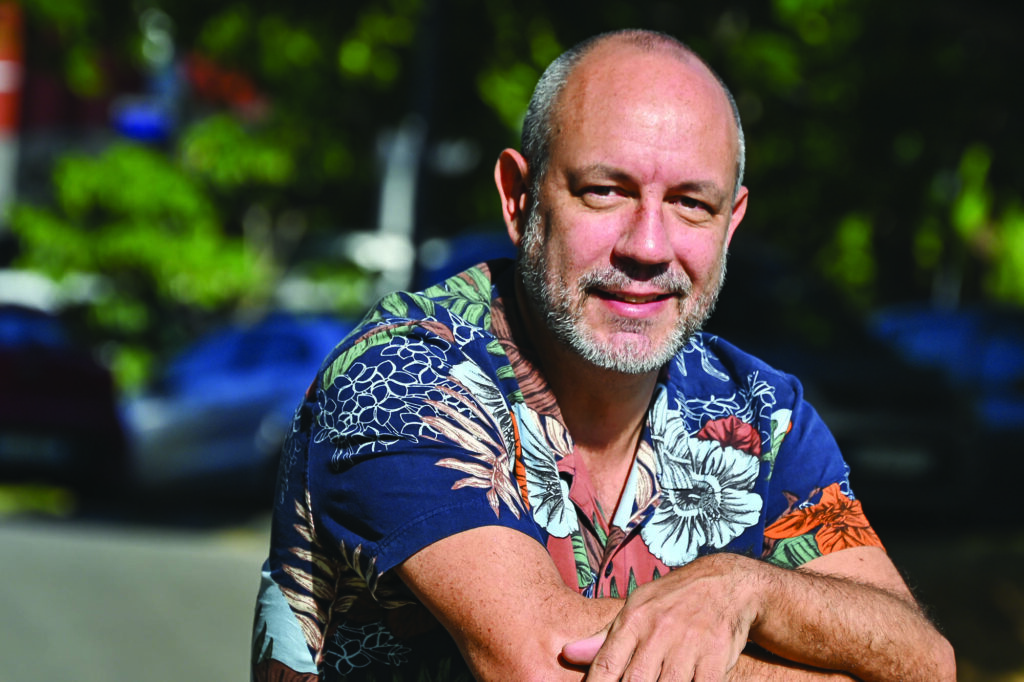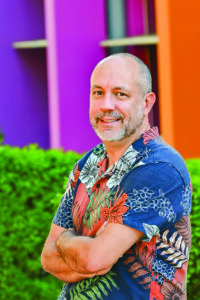
Meeting Leader : Réunionnais du monde is one of the greatest media successes in Réunion. Can you recall the genesis of this adventure? ?
Nicolas Martin : This idea came from several sources, and personal experience. Having left the island after the baccalaureate for ten years, for studies and for work, there are few places in mainland France and abroad — even the most unexpected! — where I didn’t meet any Reunion Islanders. Generally well installed and integrated, they all had one thing in common : the lack, almost a heartbreak, of their island and everything it represents in their eyes ; the kitchen, Creole, nature, family, the friends, the atmosphere, humor. Back in Reunion, knowing the existence of this «invisible community” rich in diversity and experiences, the idea came to me to create a website. Internet technology abolishing geographical and temporal boundaries, she made this project possible with very few resources. Goal : identifier, census, launch a bridge between Reunion Island and its diaspora and enable exchanges between members of this diaspora. Concretely, it was about contacting as many Reunionese expatriates as possible in France and abroad, to interview them and get them to put regularly updated mini-CVs online.
How did you proceed to successfully create this community of Reunion Islanders from around the world? ?
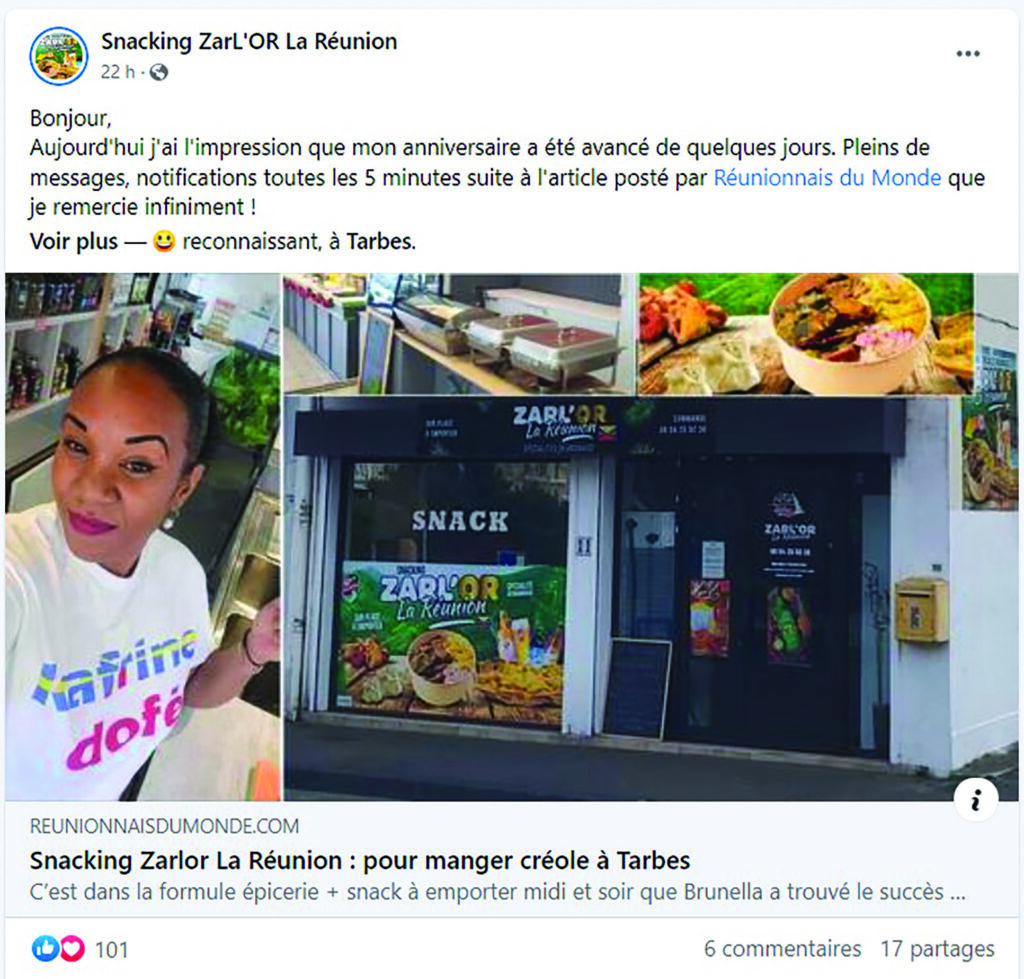

What was the reaction of the Reunion Islanders in the diaspora? ?
Word of mouth worked, registrations grew quite quickly. From the publication on the Internet of the first portraits of “expatriates” from Réunion, the site was contacted by the local press. These routes conveyed a rewarding image of Reunion and the opposite of the prevailing discourse., often dominated by fatalism, division and highlighting of news items, social problems. What could we read? The story of young people who travel, thrive in their studies and work, export Reunion values to the world, and who don't forget where they come from. More surprising : the journeys of certain young people from modest or disadvantaged backgrounds, now graduates, executives or business leaders in major world capitals. What do they tell us? Mostly they succeeded thanks to school, by following studies and taking the risk of leaving at a certain key moment in their personal history. Paradoxically, the distance brought them closer to Reunion. Volunteers to help others achieve the same journey, they are also ready to support the island in its development. They are real ambassadors for Reunion Island.
Where is the project today?, what is his audience ?
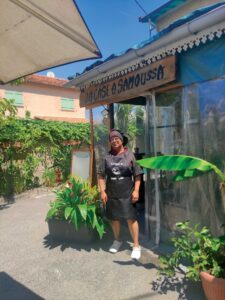
Selon Google Analytics, the site hosted 1,4 million unique visitors in 2022 : 50% in Reunion, 40% in mainland France and 10% in other overseas departments and abroad. The newsletter has 80,000 subscribers, and the community, 400,000 fans accumulated on social networks, mainly Facebook and LinkedIn. By accumulating and disseminating positive testimonies on the mobility success of Reunion Islanders, the site produces pride, a rare occurrence in the current socio-economic context : individual pride, but also for local training sectors which demonstrate their effectiveness via these success paths. Of course, not all mobility pathways are successful, it is obvious that the difficulties and problems are numerous. But an exchange network can solve a certain number of them. Connecting and sharing can, in some cases, meet the expectations that users have towards institutions like LADOM, the CNARM and the communities. What comes back, in the context of mobility, to move from a logic of assistance to a logic of resourcefulness, mutual aid, taking initiative and responsibility.
What services do you offer today on this site? ?
Réunionnais du monde is a community website with news, The portraits, a cultural agenda, an encyclopedia of a thousand celebrities, good deals, good addresses… It has also become a CV base and a job board to meet the recruitment needs of local operators. This is a priori the first job board in Reunion Island in terms of volume of job offers. Since 2022, a daily TV show exists on Réunion la 1ère, broadcast before the evening news and hosted by the talented Katiana Castelnau.
Are new developments planned ?
One of the next projects will be to overhaul the site’s alert system. The principle : Internet users subscribe by keywords — geographic, thematic — to never miss any news about their region or their centers of interest. Of course, this system also allows job seekers to remain on standby by sector of activity, levels of education or experience, just like CV recruiters are informed when a potential candidate matches their needs. This service has been very successful in recent months, with an average of 10,000 alerts triggered every day during the week.
Are you supported by public organizations or private partners in this adventure? ?
Réunionnais du monde is a company that lives exclusively from the sale of communication services to a handful of loyal partners., and the sale of HR packages for the distribution of job offers. Everything remains free for site visitors. Apart from two technical overhaul aids received from the ERDF*, this company is self-funded and has never depended on any subsidies or public money.
Reunion Islanders around the world give ample space to job offers in Reunion Island. Are there still so many Reunionese people who want to come back to work on the island? ?
The platform allows local organizations and businesses to recruit from the pool of young graduates who have gone to train outside the island.. A young population, well trained and who has, in my opinion, a competitive advantage in the local job market, because she already knows him. Over the years, the question of “return to the péi” has become central and, since 2008, the site gives voice to Reunion Islanders who share their strategies, explain by example how they managed to return and reintegrate into the local job market. Often, this involves having done internships and maintaining a network on the island even after departure.
Can we estimate the population in mainland France with an affinity link with Reunion? ?
Question difficile, because there is no official data, and this also amounts to asking “who” is from Reunion. INSEE counts between 100,000 and 110,000 people born in Reunion who live in mainland France., but this figure is surely underestimated and does not take into account many categories : Reunion Islanders who live in other overseas departments and abroad, students who go under the radar of censuses, the second and third generations, children of Reunion Islanders born elsewhere, those who were not born in Reunion, but have lived on the island for a long time, affinities born elsewhere, etc. So in the broad sense, there are surely more than 200,000 Reunionese living outside the island and a few thousand abroad. We can have an idea, not the number, but their distribution by country and department in France, by navigating the map on the reunionnaisdumonde.com home page.
Reunion gives the impression of being a thousand miles from being aware of the notoriety it has acquired in mainland France : true or false ?
Yes, certainly. The notoriety of Reunion Island has sometimes developed for the worse – shark crisis, chikungunya —, often for the good — flamboyant nature, welcoming population, surprising gastronomy. To take just the example of rougail sausage, it progresses each year in the Top 10 recipe searches on Google, it is already first in certain regions such as Brittany. But this capital of sympathy beyond our borders is ignored on the island. It’s heartbreaking and a loss of income for the local economy..
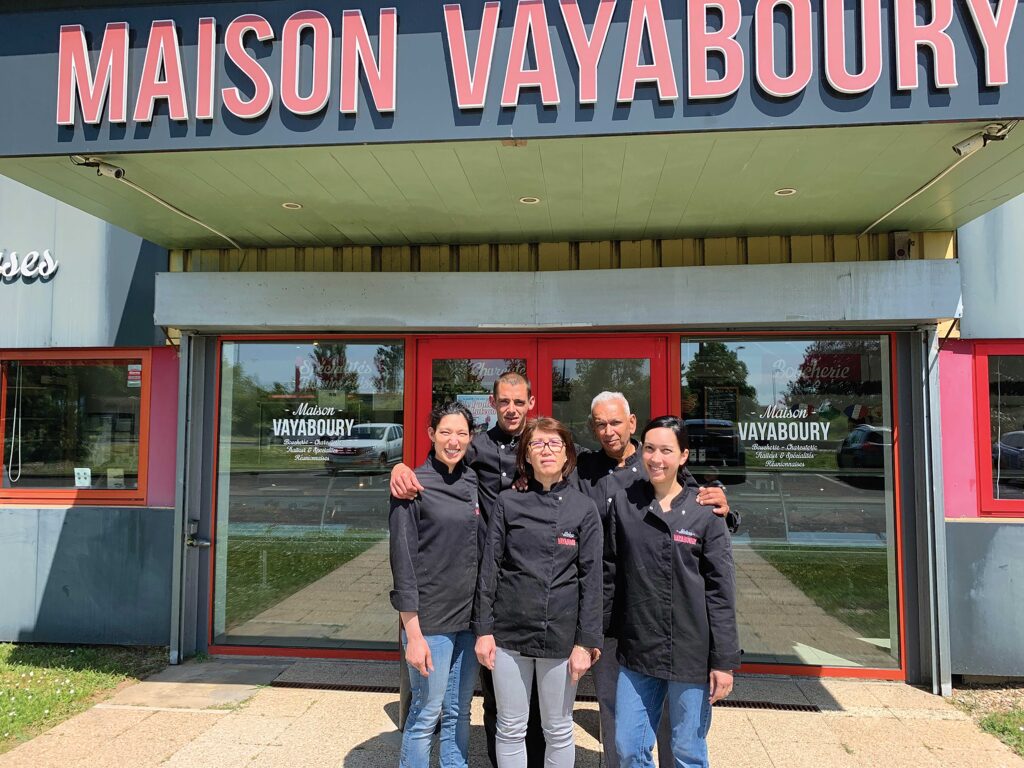
Jean-Jacques Vayaboury, founding partner, Sandra Vayaboury-Godet, co-manager
The Réunionnais du monde site counts, region by region, the number of Reunionese restaurants in mainland France : 642 by the end of 2022. What exactly does this figure cover and how do you go about establishing such an accurate census? ?
This figure counts restaurants by category, caterers, grocery stores and bar trucks (food trucks). It is difficult to keep up to date, because the openings of new establishments are weekly and the closures are also frequent in commerce. But thanks to information from network members and monitoring via social networks, Réunionnais du monde provides easy access to the geolocated map and the list by category of places to find Réunionnais products on the planet. Information that is worth gold for many expatriates and fans of Creole cuisine! There is also another benefit to this census. We know it, one of the ways of showing attachment to their island is, for Reunion Islanders from outside, to consume pei. As a direct link to inform the diaspora, the site gives a valuable boost to mobile Reunion Islanders who are launching their business. This “community helping hand” can make the difference in achieving economic balance and making oneself known in a competitive market. Gastronomy is a market to conquer on a national level.
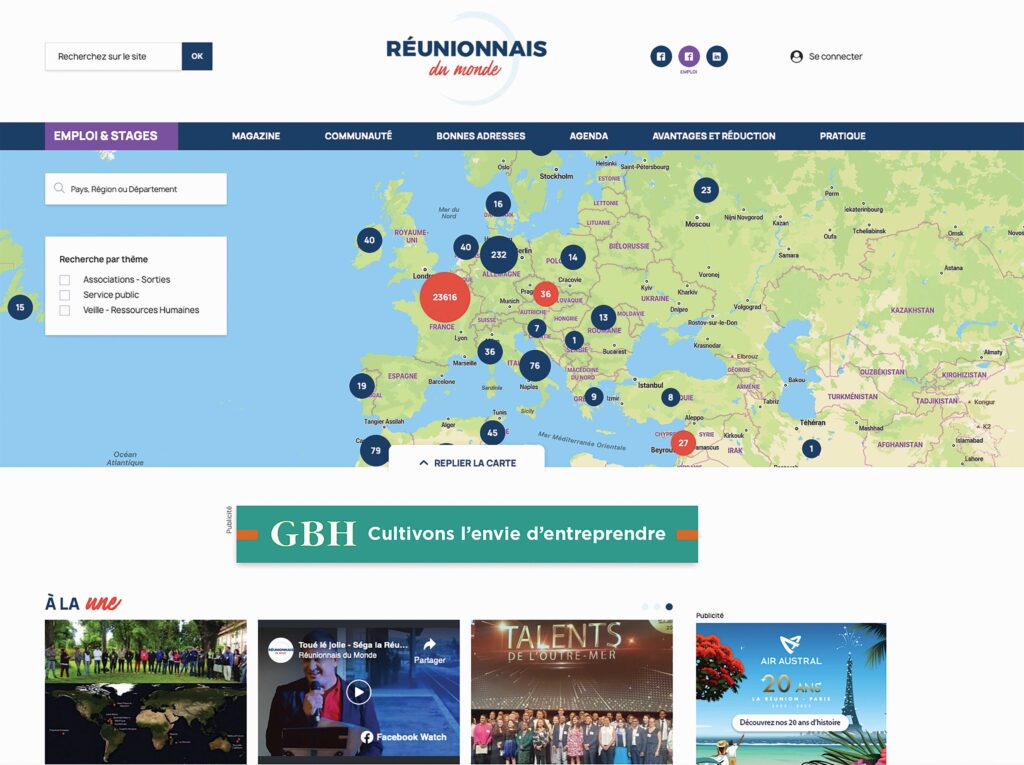
Jean-Jacques Vayaboury, founding partner, Sandra Vayaboury-Godet, co-manager
Take the case of arranged rums. Isautier is at the origin of the fashion for arranged rums which spread in mainland France. Reunion distilleries benefit from it, but ultimately the product is not always associated with the island. How to explain this discrepancy ?
Arranged rum gradually loses the Réunion origin associated with its existence. This is an example of gradual loss of authorship over a product over which we have complete legitimacy.. These last years, its sales have exploded in France. It has conquered the shelves of wine merchants and even supermarkets. But the fashion for mixed rum has attracted major retail players who, under their own brands, happily mix the origins and have made it an “island” product. We know it, the metropolitan consumer often tends to confuse Reunion Island and the West Indies. In the case of arranged rum, the confusion is total in large areas. Industrialization has diluted the Réunion origin behind a vaguely exotic banner.
We do not know in Reunion that rougail sausage, him too, made a splash in mainland France, to the point of being the victim of a sort of cultural misappropriation. About it, you even talk about loss of business. What exactly is happening ?
Thanks to the richness of its gastronomy, Réunion should be positioned on the world map, at a time when his cuisine is becoming widely known. Be identified on the map of world cuisines (in the same way that there is Mexican gastronomy, Japanese, etc.), this should be of great benefit to Reunion Island in terms of business creation, employment, structuring agricultural sectors, agri-food, industrial, d’innovation, of export… But the observation, it is that Pei dishes and recipes are appropriated by others and diverted : on an artisanal scale at fairs, living rooms, markets, and on an industrial scale in cans and in supermarkets. In my opinion, it is not a marginal or inconsequential phenomenon. L’image, the prices and quality of our products are driven down by those who do less well than us. We are losing many consumers, deceived when they taste the dishes they had heard good things about. On the long term, industrial competition is eating into the market shares of Reunion companies. Unfair competition, parasitism, image loss, quality, de business, of local employment… we unknowingly pay the price for the lack of protection of our flagships.
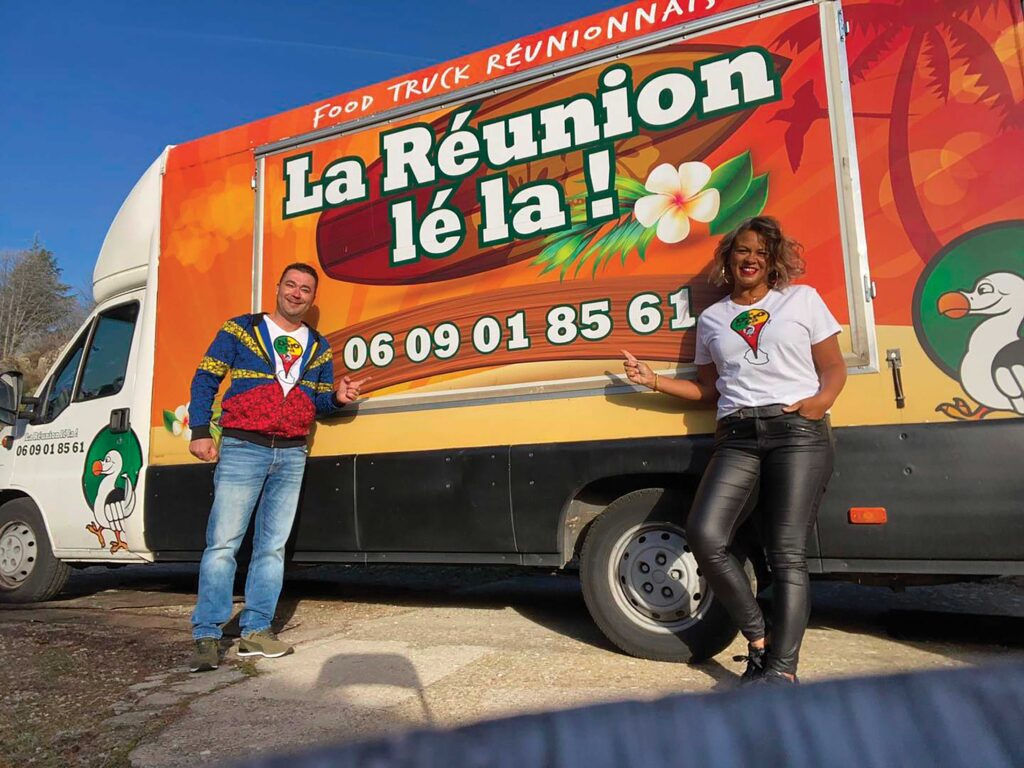
Jean-Jacques Vayaboury, founding partner, Sandra Vayaboury-Godet, co-manager
How do mainland Reunion Islanders react to this situation? ?
Fraudulent recipes, appellations bordering on a scam, West Indian packaging… Testimonials from lovers of Reunion Island, shocked by what they see in restaurants, fairs and supermarkets, are innumerable. For Fabrice Gonthier, Reunion Islander from Loir-et-Cher and great defender of the Creole art of living, “We find too many transformations of our local products in supermarkets and on the Internet. We made some great discoveries (cf. Edmond Albius) and we have an exceptional heritage, but at no time do we think about protecting our appellations. In a city, NOW, I find more Victoria pineapples from Mauritius than from Reunion Island, my metropolitan colleagues believe that Bourbon vanilla comes from Madagascar… Everything is dragged down. How to promote your culture when everything is transformed and distorted? »
What do you think of the Region's project to create a territorial brand? ?
Maybe this is a solution. But next to communication, efforts should also focus on legal protection. When will we consider the nominative values of quality or origin?? Should we protect appellations?? The recipes? The origin of the products? Geographical indication? Ensure that certain ingredients or know-how must come from Reunion Island to boost local production and employment? Perhaps arrive at protected geographical indications (IGP) or guaranteed traditional specialties (STG) ? Local decision-makers could draw inspiration from the work done in recent years on Castelnaudary cassoulet and Neapolitan pizza..
Is there a message to send to Reunionese politicians on these identity issues?, image and business ?
Whether in economic terms, cultural or tourist, I think we are still far from having exploited the tremendous potential represented by the Reunion diaspora. In France, where the sympathy capital of Reunion is strong, and in certain promising countries, future economic centers of the planet like China and India, to which we are linked by history and geography, many Reunion Islanders are ready to share their knowledge and networks. There is a dormant network just waiting to be activated and put to the service of Reunion Island.. Many territories rely on their diaspora to support their economy. Why not us?
* European Regional Development Fund.
Nicolas Martin, a journalist serving Reunion Island
“I had a traveling youth”, declares Nicolas Martin thinking back to his departure from Reunion, at the age of 18, to follow business studies in mainland France, and the trips around the world that followed : Sweden, Israel, Caribbean, Italy… Later, other destinations further broaden its horizon : Mozambique, Québec, Inde, Japan, French Southern and Antarctic lands… Nicolas Martin discovered journalism during his second year business school internship, that he carried out in Reunion within RFO. This is where he first encountered field work., microphone in hand. “A very good experience that thrilled me. " Years later, he remembers it when, returned to Reunion, he manages the human resources of several large hotels. The desire to change direction and the taste for journalism combined to make him decide to enrich his journalistic technique by training at the Professional Journalism Training Center (CFPJ) in Paris. And it was in 2002 Journal of Reunion Island that Nicolas Martin creates his first portraits of Reunion Islanders around the world. For the first time, the “invisible community” of Reunion Islanders who left to live outside the island comes out of the shadows. The success of the section made him want to go further by creating a database on the Reunion Island diaspora.. “I saw this project as a public service”, explains Nicolas Martin. Encouraged by Paul Hibon, director of the Réunion development agency (ARD), he embarks on the adventure. This is how the first version of the Réunionnais du monde site was born in 2005.. The reception from the Reunionese mainland is enthusiastic. In the 2000s, Nicolas Martin will also defend the project of active support of Reunion metropolitan associations within the SR 21, the former mixed economy company of the Réunion region. With the opening of an online store and additional services, such as job advertisements in Reunion, the Réunionnais du monde site and its monthly letter have reached their cruising speed. This unique media, link between Reunion Islanders around the world and with their native land, is currently in its fifth version.


